News
Corporations call on startups for help with pet food innovation
24 Sep 2024The pet food industry is pushing to partner with startups to stay ahead of trends and deliver innovative, sustainable, and functional products.
There is a growing trend shaping the pet food industry, according to Mintel’s report The Future of Pet Food 2024: pet owners are increasingly treating their pets like family members.
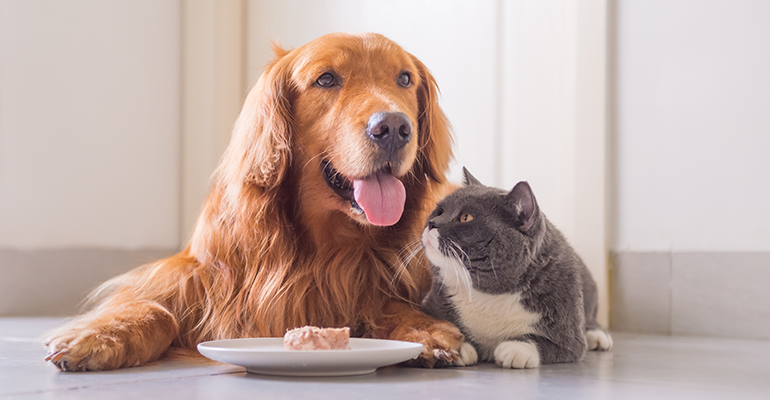
Because of this, pet owners are looking toward premium products with organic, “free from additives”, and “supporting overall wellness” claims – a trend that mirrors what is happening within the human food space.
Alongside wellness becoming a central theme in pet food, sustainability is a major concern for some, especially younger pet owners. However, financial constraints mean some pet owners deprioritise more expensive sustainable options for cheaper, less sustainable products.
Major players in the food industry, including Nestlé and Mars, have acknowledged these consumer trends and demands, and are responding by turning their attention toward pet care innovation.
Programmes like Nestlé’s Purina’s Unleashed accelerator and Mars Petcare's Open Innovation Challenge are calling on startups to help bring fresh ideas to pet care.
Purina’s Unleashed: Selected startups will receive mentorship, funding, and networking
The Unleashed programme, launched by the Purina Accelerator Lab in 2020, runs yearly and targets startups within the pet care industry. The Lab looks for innovative solutions that could improve the lives of both pets and their owners.
Applications for the 2025 cohort close on 30 September. The winners – ten selected startups – will be announced in February 2025.
As the Unleashed website suggests, Purina is looking to collaborate with and support startups that bring disruptive technology to pet care. The programme's focus areas include pet services, health technologies, novel nutrition, and new types of pet food ingredients.
Both B2C and B2B startups are invited to apply, given they can demonstrate sustainable and scalable business models. Business ideas will be evaluated based on their ability to answer customer problems.
The programme casts a wide net, targeting startups across Europe, the Middle East, Asia-Pacific, Oceania, and Latin America.
Alongside collaboration opportunities, the accelerator programme provides the selected startups with mentorship from Purina and industry experts, and opportunities for funding, networking, and expert guidance.
Previous winners include plant-based pet food protein ingredient
Winners from the 2023 cohort include Arbiom, creator of SylPro, a protein-rich ingredient made from sustainable sources using yeast fermentation, with applications for premium and plant-based pet food diets.
LampoVet, an online portal for gut microbiome analysis, personalised nutrition, and virtual consultations with vet specialists, was also selected in 2023.
Finnish startup EniferBio was a winner in the 2022 cohort. EniferBio has developed a fungi-based “drop-in” mycoprotein, suitable for pet food, from renewable raw materials using fermentation.
In 2021, PawPots, based in the United Arab Emirates, made its way on to the winners’ list. The company is an online meal subscription service for animals, delivering freshly cooked and customised daily servings.
Mars Petcare’s Open Innovation Challenge
The Open Innovation Challenge was initiated by Mars Petcare in 2024, in partnership with EIT Food. The challenge is part of Mars Petcare’s broader commitment to sustainability and innovation.
Mars Petcare is an arm of Mars, Incorporated, and includes nearly 50 pet food brands such as Pedigree, Whiskas, Temptations, and Cesar. EIT Food is a pan-European organisation and innovation community supported by the European Institute of Innovation and Technology (EIT), a body of the European Union.
The challenge's primary objective is to promote the use of sustainable ingredients in pet food by transforming agricultural products that would normally be considered waste, such as straw from crop harvesting and discarded peel from chopped vegetables, into digestible and nutritious ingredients for pet food.
In particular, the challenge looks for solutions capable of breaking down lignin, hemi-cellulose, or cellulose contained within fibres into safe and nutrient-rich proteins or sugars that are digestible by dogs and cats.
Applications closed earlier this month.
Related news

UK consumers could be eating cultivated meat within two years
26 Mar 2025
Cell-cultivated products (CCPs), from chicken nuggets to beefburgers, could be on UK supermarket shelves by 2027 after regulators launched a sandbox to accelerate approvals.
Read more
Rapidly expanding pet ownership in Asia fuels demand for pet vitamins and science-backed nutrition
10 Dec 2024
Pet ownership rates have exploded across Asia in recent years. China is leading the way, with predominantly young, urban, female pet owners driving the latest pet food and supplements trends.
Read more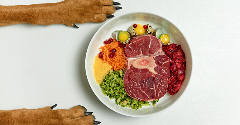
Rethinking pet nutrition: The rise of minimally processed fresh and raw pet food
7 Nov 2024
Concerns over ultra-processed foods (UPFs) and their long-term health effects could see consumers slowly move away from the traditionally dominant kibble.
Read more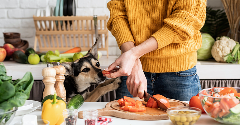
Burning questions: What AGEs mean for human and pet health
30 Oct 2024
As research into advanced glycation end-products (AGEs) evolves, food manufacturers are faced with growing questions about how these compounds, formed during high-temperature cooking, impact human and animal health.
Read more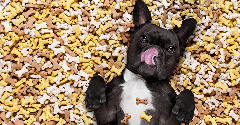
Cultivated meat authorised in the UK
22 Jul 2024
British brand Meatly has achieved regulatory approval to use cultivated meat in its pet food products, a first for Europe.
Read more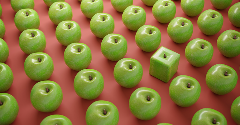
Mintel’s most innovative food and drink of 2024: Part II – Bakery, dairy, ready meals, and more
16 May 2024
The Mintel Most Innovative Food and Drink 2024 showcase features eleven novel products that stand out as particularly disruptive and compelling. In part II of this roundup, we explore the most innovative bakery, dairy, meals and meal components, pet fo...
Read more
Mintel’s most innovative food and drink of 2024: Part I – Snacks and beverages
15 May 2024
Despite stalled new product development and a challenging market for food and drinks brands, many creative and disruptive new products have hit the shelves around the world. Mintel analysts have picked the most innovative snacks and beverages.
Read more
US pet food regulations unravel the mysteries of product labelling
4 Mar 2024
New regulations governing the labelling of pet foods were approved by AAFCO members last July, providing the first major update to pet food regulations in 40 years. The move was a response to pet owners asking for clarity on labels that left many confu...
Read more
Lack of oversight in pet food could pose health risk to humans
22 Nov 2023
The pet food industry needs stricter health and safety standards, particularly as handling raw pet food can spread foodborne illnesses to humans, including Salmonella and Listeria, according to stakeholders.
Read more
Nestlé faces US lawsuit for allegedly false advertising pet food as ‘natural’
16 Nov 2023
Legal action has been brought against Nestlé Purina Petcare in the US, after various products were allegedly falsely marketed as ‘natural’, despite containing multiple synthetic ingredients.
Read more